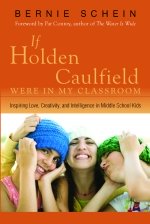
February 01, 2011
If you have trouble viewing this newsletter, set up your email options to "always allow images from this address."
We are pleased to bring you BCQ's own series, Life Between My Pages!
This series will feature a selected author each month who will share with you their personal story about how they got to where they are today.
Prepare to be completely WOWED by these writers! You've read their books, fallen in love with their style, now learn about their journey.
Each month, when the newsletter shows up in your inbox, look for the featured author's name in the subject line. Some authors you will immediately recognize, some you will not. We can assure you that every single author invited to participate will tell a story you won't want to miss!
February 2011:
Bernie Schein

"Teacherís Comments" on every one of my report cards: "Bernie lives in his own world." They were right. I did. It beat theirs. And that world later would become my own classroom, re-created after I retired in If Holden Caulfield Were In My Classroom.
I didn't like theirs, it was boring: impersonal, irrelevant, uninspiring, had nothing to do with my interests, feelings, thoughts, aspirations. In short, a prison sentence. Not only for me and most of my classmates but for most of my teachers too, I would come to realize.
If only I had known then what I know now. They obviously meant that I was inattentive in class, to say nothing of a screw-off. I see that as a natural reaction to boredom. In retrospect, boredom probably stimulated and enhanced my sense of humor, my outrageousness, which in the adult world may have continued to get me in a bit of trouble sometimes but also added boatloads to my voice as a writer and teacher. Not to brag, but showing off a bit and having fun and being irreverent and comical is more appreciated in the adult world than in school, where they sentence you to detention or suspend you for it. More often than not, educators are interested only in hearing their own voices, which of course is the problem. If children aren't heard, they aren't seen.
If a plague of laryngitis was visited upon educators, think how liberating that would be for kids.
Let us pray.
Invisibility begins immediately. Upon entering school in first grade, like all children I had a million questions: What makes the sun shine? The wind blow? Why when I throw a ball against a brick wall does it come back, and at the same speed? Why do girls sit down to pee? (I had only brothers). Can rocks breathe? If so, why; if not, why not? Why when I leap for the third ring of the monkey bars, unlike my classmates I fall on my butt every time? (I was too young to realize height makes the difference.). If everyone screamed and yelled in public, would that make it okay for me to do it too? I don't like sharing, so why do I have to? Who exactly is God? Why do teachers ask us questions that are already answered in the book we're reading? (Can they not read?) I could go on and on.
Why should I answer their questions if they have no interest in mine? See my conundrum here? Certainly I didn't want to wait weeks to get answers from a book. They didn't give us weeks to answer theirs.
I turned off. I daydreamed all through school. Had I not, I would have cloned their questions rather than realizing my own without even knowing it. Thus: "Bernie's in his own world."
Thank the Lord, because when you forget your questions, you forget who you are. That's why kids who make straight "A's" and score in the statistical stratosphere on standardized tests are so unoriginal and uncreative and often boring. Little independent thought, little capacity to express honest emotion, little inspiration, so no ideas of their own.
I have plenty of ideas of my own. That's why my standardized test scores were in the negative numbers.
Not only should we follow the kids' interests and passions, we should be grateful for their invitation into their world and to the degree possible enter into it with them and see it through their eyes. To see the world through their eyes is to open theirs to ours, to the greater one. Every time one of my students writes a story he's creating his own world and if it's good we live in it with him and if it's not I try, as a teacher, to inspire or to challenge him make it somehow more inviting. What I do not to is dismiss it. Dismissing it dismisses the student, which is unknowingly and unintentionally what my teachers did to me. Why? Because that what was done to them. (It's a shame, because teachers on the whole are truly the most wonderful people I've ever been associated with. Just being with the young in and of itself insures at least the survival of a particle of curiosity and humor. Most at least like kids, and it's nice to be liked).
So is all this merely a rationalization for narcissism, for self-centeredness? No, because generosity can only genuinely spring from self-fulfillment. Only if you know yourself and see yourself honestly can you know others and see them honestly, can you give them their due, can you understand your relationship with them--parent, siblings, friends, enemies--whether in the story you're writing, the one you're reading, or in real life.
Self-knowledge is essential to worldly knowledge. And the self in the school I attended was seen as that proverbial empty vessel in which information was to be poured like clockwork. The problem was, like most people, my vessel already had plenty in it. Think about it: By middle school every child in America has suffered to one degree or another what every adult has suffered, which just happen to be all the great themes of literature and history already inside them: sibling rivalry (I have two brothers), unrequited love (at 13 I was smitten), friendship and betrayal (for "popularity"), thwarted ambitions cut from the basketball team), loss (of a pet, a grandparent), identity (a Jew in a small Southern town)...Again, I could go on and on, the great themes of history and literature jostling for attention inside me, bursting for freedom, for expression, coming out finally in spite of 12 straight years doused with the cold water of American education.
Thank you for entering my world, and thank you for inviting me into yours.
by Bernie Schein
Middle school is hard enough for kids. They have just entered adolescence, they are struggling to fit in and find a group where they belong, and on top of that, they actually have to sit in a classroom and learn! It's no wonder these kids act out from time to time. They have a lot to on their plate socially and scholastically.
What many kids don't realize is that teachers care...they care a lot. In many cases there is a teacher that goes that extra mile for a student, and in return, that student is forever grateful. Bernie Schein was one of those teachers.
If Holden Caulfield Were in My Classroom: Inspiring Love, Creativity, and Intelligence in Middle School Kids (Sentient Publications, September 2008) by Bernie Schein, shows how, as a middle school teacher for 40 years, he used humanity, humor, and compassion to get his students to reveal secrets of their lives, helping them through joyous and difficult endeavors, when they might feel left out, bullied, put upon, angry, uninterested, disengaged, lonely, or sad. Through stories from his classroom, he describes how true emotion, rather than pure reason, is the key to real relationships, creativity and intelligence.
If Holden Caulfield Were in My Classroom is full of stories that will inspire and encourage all that read the book. Children can succeed in whatever they want to do, but sometimes they do need a little extra support to help get them there. Bernie Schein's teaching methods are practical and caring, yet unique to each student he reaches out to. Schein's book is for educators, parents, grandparents, and anyone who wants to help children learn.
Bernie Schein has been an educator for over 40 years. He holds a Master of Education degree from Harvard University, with an emphasis in educational psychology. He lives near Charleston, South Carolina with his wife.
ORDER or PURCHASE from SentientPublications.com, Amazon, or your local book store.
EMAIL Bernie at bernie1@hargray.com
Learn more about Bernie at BernieSchein.com.
Read BCQ's review of If Holden Caulfield Were In My Classroom.

Have a friend who would enjoy Book Clubbers?
We would be honored for you to share our newsletter with any book lover you know!
Are you reading this on a recommendation?
If you like what you see, come
sign up
with us! It's quick, easy, and free!